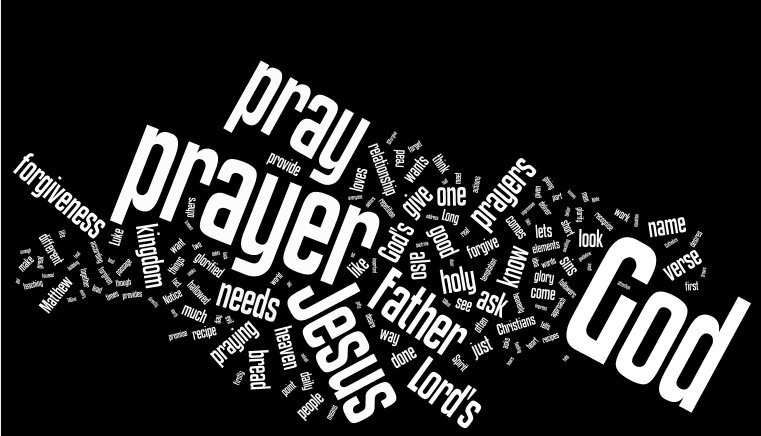I preached on the Lord’s Prayer today.
Here’s my sermon as a word cloud thanks to wordle…

Here are my points in list form (mostly from Matthew 6)…
- Jesus says “this then is how you should pray”… not “this then is what you should pray”… The Lord’s Prayer is not a script for a prayer.
- One of the great ironies in Christian culture is that we have taken the Lord’s prayer and done with it exactly what Jesus was telling people not to do. Before teaching people how to pray he teaches them how not to – he warns against babbling like the pagans. The Lord’s Prayer is not a mantra to pray over and over again, but a guideline…
- The Lord’s Prayer is short.
- Prayer is for Christians – we’re to pray for God as “our father”…
- “Hallowed be your name” is primarily a request, not a statement. I got this idea from John Piper. I’d always read that line as a statement about how great God’s name is. ..
Sanctify can mean make holy or treat as holy. When God sanctifies us, it means that he makes us holy. But when we sanctify God, it means that we treat him as holy.
- Prayer shouldn’t be contrary to our actions. We shouldn’t pray for God’s will to be done and not be trying to do it, we shouldn’t pray for forgiveness without forgiving others…
- God, as our loving father, wants to provide for our material needs as well as our spiritual needs (which he provides through Jesus). We’re so scared of the prosperity doctrine that we kind of dismiss the idea that God has promised to look after our physical needs. I found Soph’s post on the fountainside pretty helpful on this point.
- The idea that our forgiveness depends on us first forgiving others is pretty confronting. It’s in the verses just after the Lord’s Prayer and comes up again in Matthew 18. This is probably a point that is underdone in our evangelical “faith alone” circles… here’s the bit at the end of the Lord’s Prayer.
14For if you forgive men when they sin against you, your heavenly Father will also forgive you. 15But if you do not forgive men their sins, your Father will not forgive your sins.
Comments
The only possible objection that came to my mind while hearing the sermon was that some versions of Luke 11 say "when you pray, say…"
I don't actually think that means those are the only words we should pray. But a rough equivalent of "this is what you should say" is said.
Also, I'm not entirely sure "hallowed be your name" is primarily a request rather than statement. I'm not saying it's NOT, just that I'm unconvinced one way or the other. The CEV (I was never much of a fan of it but have heard it said it's actually a pretty decent translation) says "help us to honour your name". Which I guess is a request, but it's a request for us, not God, if that makes sense. I guess it's like that line you quoted, "we treat him as holy"… not asking him to treat himself as holy. Which was the impression I got from the sermon.
The rest of it was good too. I think last time you preached you made the observation (afterwards, in a blog) that you unwittingly repeated a lot. I don't think you did this time.
Here's Piper's sermon – with a reference to the Greek…